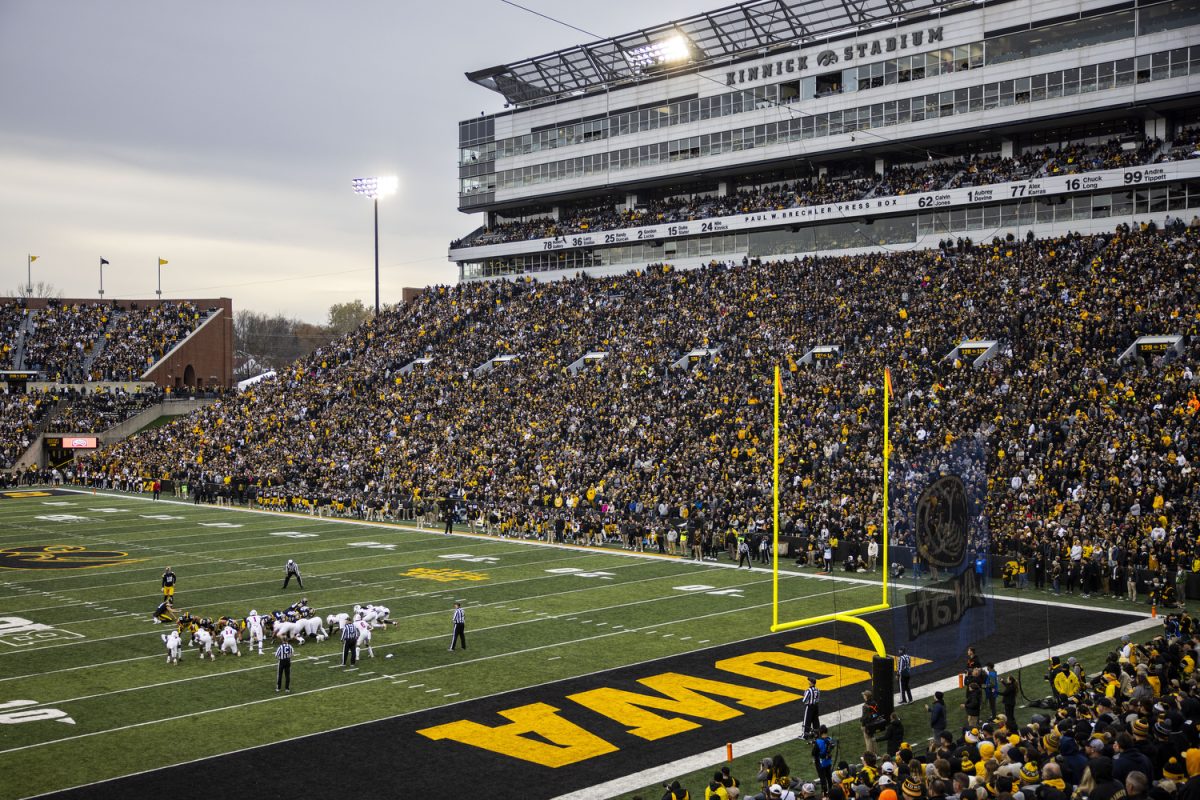Throughout this season, Iowa head football coach Kirk Ferentz has consistently used the phrase ‘complementary football,’ to describe his team’s effort on Saturdays. Yet this term was highly inaccurate and a gross overstatement as to the reality of the Hawkeyes’ performance in their first nine games of the season.
Take Iowa’s 10-7 win over Northwestern last week as an example. In what way does the Iowa offense complement the defense and special teams when it totaled 169 total yards and three yards per play? Yes, the unit scored following a blocked punt, but that drive was just 25 yards.
In addition, the offense certainly wasn’t doing anyone a favor when it went three-and-out following the defense’s goal-line stand. Such ineptitude forced a punt from near the end zone, and the Wildcats took full advantage of the field position, eventually scoring to tie the game. At Wrigley Field, the Hawkeye offense was more detracting than complementing.
But enough with that game. After Iowa’s 22-0 throttling of Rutgers on Saturday, Ferentz again used the term to describe his squad’s performance. This time around, the head coach couldn’t have been more correct, as Iowa football played its most complete game this season by far.
Holding the Scarlet Knights to zero points on three yards per play, the Hawkeye “D” earned its first shutout of the season while the offense amassed a season-best 402 total yards. Kicker Drew Stevens nailed three field goals to go along with Iowa’s two offensive touchdowns.
Now that is complementary football: all three phases registering respectable numbers while assisting each other in field position.
To be perfectly honest, it was kind of difficult to find many flaws in any of the three phases. Granted the defense had the better performance, as 19 points of Iowa’s scoring output arrived in the second half.
Yet even in those first 30 minutes of football, the Iowa offense totaled 184 yards on four yards per play. Of course, quarterback Deacon Hill’s interception wiped off the possibility of Iowa scoring double figures in the first half, but the Wisconsin transfer carried the offense on that drive.
Accounting for all 62 of the yards, Hill completed five of his seven passes, averaging 12.4 yards per completion, and for a brief moment looked like a truly qualified Power Five starter under center. Yet all that came crashing down to Earth as Hill’s inexperience became glaringly apparent on his interception to end the half. Staring down receiver Seth Anderson during the play, Hill’s toss shouldn’t have even been thrown in the first place, as Anderson was blanketed in coverage.
But here’s what I think is special, and what fans should appreciate, about Hill: the guy just never hangs his head. Many of the quarterback’s teammates, among them receiver Kaleb Brown and Mason Richman, testified to Hill’s ability to block out the outside noise and focus on the matter at hand.
Before this season, the last time Hill took any meaningful snaps was in high school. Plus, the second-year still isn’t of the legal age to crack open a cold one. For him to have a performance as he did, with over 200 passing yards (the first time an Iowa QB has done so in the last 12 games), was certainly a stepping stone to becoming more than a game manager.
I’ve been hard on Hill in the past, and any criticism is warranted for a D1 starting QB. But Saturday’s performance unveiled Hill as more of an asset than a liability for the Hawkeyes.
With a solid ground game consisting of three rushers over 50 yards averaging at least five yards per carry, the Hawkeye ground game got back to its old self. The most shocking offensive number from Saturday might just be the zero three-and-outs. Truthfully, I never thought I’d see that day this season.
Only punting three times, Iowa’s offense didn’t leave defensive coordinator Phil Parker’s unit out to dry in short field position, and the group took full advantage. Or, in other words, I completely neglected the power of Iowa’s “D” in front of a Kinnick crowd (in case you were wondering, I did pick Rutgers to win … what an idiot I am).
Holding the Big Ten’s top rusher Kyle Monangai to 39 rushing yards while limiting mobile QB Gavin Wimsatt to a net of -2 yards on the ground was no small feat. Thanks in part to multiple false starts on the Scarlet Knights, the Hawkeyes never allowed a trip into the red zone, restricting Rutgers to 1.5 yards per carry.
Just based on those numbers alone, the Hawkeyes dominated. I don’t even have to mention Wimsatt’s seven completions and an interception, good enough for a 71.2 passer rating.
Yes, that Hill interception and dropped snap can’t be happening in closer games, but the more important takeaway from this one is that Iowa truly played complementary football, and had fun while doing so.
Ferentz was, as we youth like to say, ‘in his bag,’ during his postgame press conference, jokingly calling out Hill for his out-of-date car in need of a paint job, and even dropping in a quip about a possible offseason fitness program for his husky QB.
Those lighthearted comments would never be said if Hill had his usual performance, or if the quarterback didn’t have the full trust and confidence of his head coach.
Saturday’s offensive explosion and Hill’s impressive day may have just been a mirage, as Iowa’s defense will no doubt lead the team the rest of the way. But with Minnesota, Nebraska, and Wisconsin’s losses this week, Iowa has gained yet another game in the Big Ten West standings and can clinch a title at Kinnick next Saturday against Illinois.
Some duct tape has been added to Iowa’s thread of a season, so why not continue to be bold with the offense and see what this ‘complementary football’ thing is all about?



